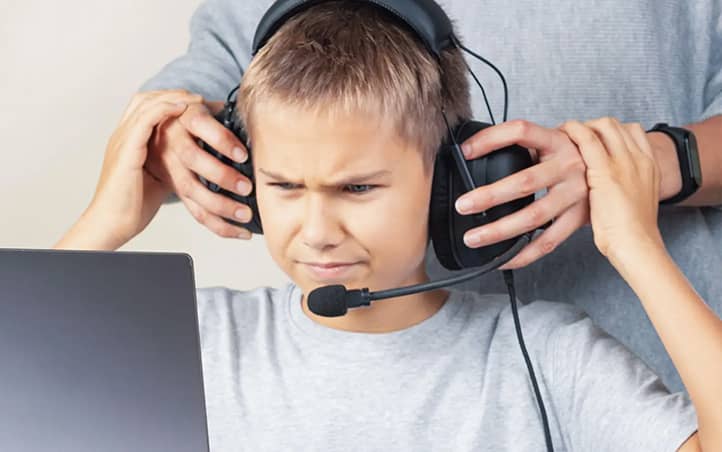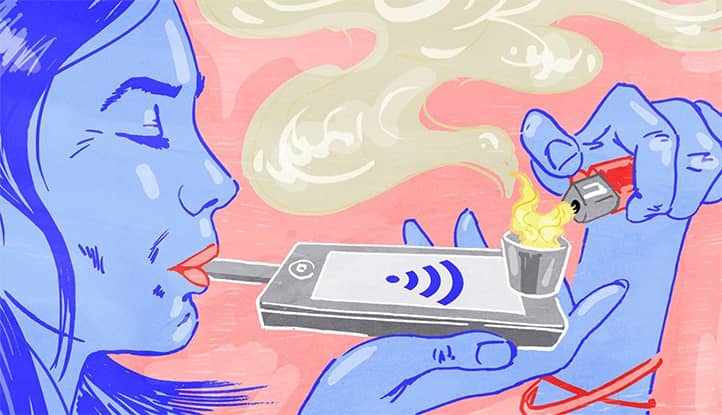In the digital age, the Internet has become an integral part of our lives. However, excessive use of the World Wide Web can lead to serious problems. In this article, I will talk about the psychological aspects and consequences of Internet addiction, as well as methods of its diagnosis, prevention and treatment.
Internet addiction is a compulsive and uncontrolled use of the internet that disrupts daily life, decreases productivity, and worsens mental and physical health. This term was first proposed in 1995 by American psychiatrist Ivan Goldberg.
Each year, internet addiction becomes an increasingly pressing issue. According to various studies, between 6% and 20% of internet users worldwide suffer from some form of this disorder. Adolescents and young adults are particularly vulnerable, as the virtual world often appears more appealing than reality.

Factors Contributing to Internet Addiction Development
Internet addiction, like other behavioral addictions, does not arise in a vacuum. It results from the complex interaction of various factors, including personal traits, social environment, and individual psychological needs.
Understanding the factors that contribute to internet addiction is key to developing effective prevention and treatment strategies. This knowledge helps identify at-risk groups and create targeted support programs for those most susceptible to this modern disorder.
Personal Characteristics
Certain personality traits may increase the risk of developing internet addiction. These include:
- Low self-esteem;
- A tendency toward depression and anxiety;
- Lack of self-confidence;
- Issues with self-control;
- A tendency to avoid problems.
People with these characteristics may use the internet as a way to escape reality and compensate for their perceived shortcomings.
Social Factors
Social factors also play a significant role in internet addiction development:
- Loneliness and social isolation;
- Family or relationship issues;
- Difficulties with face-to-face communication;
- Lack of support from close ones;
- Peer or societal pressure.
The internet may provide an illusion of social support and acceptance that is lacking in real life.
Psychological Needs Fulfilled by the Internet
The internet can fulfill various psychological needs:
- The need for communication and belonging;
- The need for self-expression and recognition;
- The need for new experiences and thrills;
- The need for control and power (especially in online games);
- The need to escape reality and for escapism.

Mechanisms of Internet Addiction Development
Internet addiction does not form instantly; it is a gradual immersion into the virtual world accompanied by changes on psychological and neurobiological levels. This process can be likened to forming a rut on a road: the more we travel the same path, the deeper the rut becomes, and the harder it is to escape.
It’s interesting to note that the mechanisms of internet addiction development are similar to those of other addictions, such as alcohol or drug dependency. This similarity underscores the seriousness of the issue and the need for thorough study.
Understanding the mechanisms of internet addiction not only sheds light on the nature of this disorder but also opens up new perspectives for its treatment and prevention. Knowing how and why addiction forms enables us to develop more effective intervention and support strategies.
Neurobiological Basis
Internet addiction has a neurobiological basis similar to other forms of addiction. When using the internet, dopamine—a neurotransmitter responsible for pleasure and reward—is released. Over time, the brain becomes accustomed to higher dopamine levels and requires increasing stimulation to achieve the same effect.
Psychological Mechanisms
The psychological mechanisms involved in internet addiction include:
- Operant conditioning: Positive reinforcement (pleasure from internet use) reinforces behavior.
- Cognitive distortions: Forming unrealistic expectations and beliefs about the internet’s role in life.
- Compensatory behavior: Using the internet to compensate for real-life deficiencies.
- Emotional regulation: Using the internet to manage negative emotions.

Symptoms and Signs of Internet Addiction
Recognizing the symptoms and signs of internet addiction is often the first step toward acknowledging the problem and seeking help. Just as a doctor uses symptoms to diagnose a disease, psychologists and psychotherapists rely on specific signs when identifying internet addiction.
It’s important to note that internet addiction symptoms can manifest differently in various people and age groups. What is normal for one person may be a sign of a serious problem for another. Thus, evaluating symptoms should always consider the individual’s context and life situation.
Knowing the symptoms and signs of internet addiction is crucial not only for specialists but also for regular people. It helps spot the problem early in oneself or loved ones and take necessary steps to address it before it takes a more serious form.
Behavioral Indicators
The main behavioral signs of internet addiction include:
- Spending increasing amounts of time online;
- Neglecting other activities to stay online;
- Inability to control time spent on the internet;
- Lying about the time spent online;
- Using the internet as a way to escape problems;
- Continuing to use the internet despite negative consequences.
Emotional Manifestations
Emotional symptoms of internet addiction may include:
- Feeling euphoria when using the internet;
- Irritability or anxiety when unable to go online;
- Feelings of guilt or shame for excessive internet use;
- Loss of interest in real life;
- Mood swings related to internet use;
- A sense of emptiness or depression offline.
Physical Symptoms
Physical symptoms of internet addiction may include:
- Sleep disturbances (insomnia, altered sleep schedule);
- Headaches and back pain due to prolonged computer use;
- Dry or strained eyes;
- Neglect of personal hygiene;
- Weight changes (both gain and loss);
- Carpal tunnel syndrome due to excessive keyboard and mouse use.

Psychological, Social, and Physical Consequences of Internet Addiction
The consequences of internet addiction are like ripples on water: they spread far beyond the immediate use of the internet, affecting virtually every aspect of a person’s life. From deteriorating physical health to the breakdown of social relationships, the impact of excessive internet use can be truly extensive.
Of particular concern is the impact of internet addiction on the developing brains of children and adolescents. At a time when critical neural connections and social skills are forming, excessive immersion in the virtual world can have long-term negative consequences for cognitive and emotional development.
However, it’s important to remember that the consequences of internet addiction are neither inevitable nor irreversible. With early identification of the problem and the right approach to its solution, many of the negative effects can be minimized or even fully overcome.
Changes in the Emotional Sphere
Internet addiction can lead to serious emotional changes:
- Increased anxiety and irritability;
- Depressive states;
- Emotional instability;
- Reduced empathy and emotional intelligence;
- Difficulty recognizing and expressing emotions in real life.
Cognitive Impairments
Excessive internet use can negatively impact cognitive functions:
- Reduced attention span;
- Decline in memory, especially short-term memory;
- Difficulty with planning and decision-making;
- Decline in critical thinking;
- Issues with processing information in the real world.
Problems in Interpersonal Relationships
Internet addiction can severely impact a person’s social life:
- Deterioration of relationships with family and friends;
- Social isolation and loneliness;
- Difficulty establishing and maintaining real-life relationships;
- Replacing real communication with virtual interaction;
- Conflicts due to excessive internet use.
Difficulties in Studies or Work
Internet addiction can negatively affect productivity:
- Declining academic performance in school or university;
- Issues fulfilling job responsibilities;
- Procrastination and postponing important tasks;
- Loss of interest in real achievements;
- Risk of job loss or expulsion from educational institutions.
Health Problems Associated with a Sedentary Lifestyle
Prolonged computer use or smartphone addiction can lead to several physical problems:
- Obesity due to lack of physical activity;
- Cardiovascular diseases;
- Posture issues and back pain;
- Decreased physical endurance;
- Weakened immune system.
Sleep and Eating Disorders
Internet addiction is often accompanied by:
- Disrupted circadian rhythms and insomnia;
- Irregular and unhealthy eating habits;
- Skipping meals or overeating;
- Dehydration due to insufficient water intake;
- Eating disorders.

Diagnosis of Internet Addiction
Diagnosing internet addiction is a complex task that requires a comprehensive approach. Unlike chemical dependencies, where a blood or urine test can be conducted, identifying internet addiction relies on more subjective criteria and assessment methods.
Interestingly, the process of diagnosing internet addiction often encounters the problem of normalizing excessive internet use in society. What would have been considered a clear sign of a problem just a couple of decades ago may now be seen as the norm, complicating the task for specialists.
A multidisciplinary approach plays a crucial role in diagnosing internet addiction. Collaboration among psychologists, psychiatrists, neurologists, and IT specialists provides a fuller picture of the problem and enables the development of effective strategies to address it.
Diagnostic Criteria
The criteria proposed by Dr. Kimberly Young are often used for diagnosing internet addiction:
- Compulsive desire to check email or go online
- Constant anticipation of the next time going online
- Complaints from others that a person spends too much time online
- Complaints from others that a person spends too much money on the internet
- Inability to control the time spent online
- Lying about the amount of time spent online
- Lifestyle changes to allow more time online
- Changes in emotional state (e.g., irritability) when internet access is unavailable
For a diagnosis, at least five of these criteria must be present.
Assessment Methods
Various methods are used to assess internet addiction:
- Kimberly Young’s Internet Addiction Test (IAT)
- Chen Internet Addiction Scale (CIAS)
- Internet-Related Problem Scale (IRPS)
- Diagnostic Interview for Internet Gaming Disorder (DIIGD)
- Clinical observation and history collection
It is essential that internet addiction diagnosis is conducted by a qualified specialist, considering the individual’s overall psychological state and life circumstances.

Prevention and Treatment of Internet Addiction
Preventing and treating internet addiction is more than just tackling symptoms; it’s a comprehensive process aimed at restoring balance in a person’s life. Similar to how a gardener nurtures a plant by creating favorable growth conditions, mental health professionals work to create an environment that encourages healthy internet use.
Effective prevention and treatment strategies for internet addiction often include elements that may seem paradoxical at first. For example, using technology to limit online time or creating online support communities for those striving to overcome internet addiction.
A key aspect of preventing and treating internet addiction is fostering digital literacy and a culture of healthy technology use. This isn’t merely an individual choice but an important social task that requires efforts at the family, educational, and societal levels.
Educational Programs
Preventing internet addiction should begin with raising awareness about the issue:
- Informing about the risks of excessive internet use
- Teaching skills for safe and responsible network use
- Media literacy programs for children and adolescents
- Seminars for parents on monitoring children’s internet use
- Incorporating the topic of internet addiction into school curricula
Developing Alternative Interests
It’s important to encourage the development of interests and skills outside of the internet:
- Supporting engagement in sports and physical activities
- Encouraging creative abilities (music, art, crafts)
- Promoting reading books and attending cultural events
- Organizing group activities and interest clubs
- Volunteering and community service
Cognitive Behavioral Therapy (CBT)
CBT is one of the most effective treatments for internet addiction:
- Identifying and changing dysfunctional beliefs about the role of the internet
- Teaching self-control and time-management skills
- Relaxation techniques and stress management
- Behavioral experiments to overcome the fear of real communication
- Gradual reduction of time spent online
Group Therapy
Group therapy can be effective for people with internet addiction:
- Sharing experiences and mutual support
- Developing real-world communication skills
- Practicing social skills in a safe environment
- Group discussions of problems and solution strategies
- Role-playing to practice new behavior patterns
Family Therapy
Family therapy can be beneficial, especially when internet addiction affects children or adolescents:
- Improving family communication
- Establishing rules for internet use within the family
- Teaching parents skills for support and control
- Working on family conflicts related to internet use
- Creating alternative family activities unrelated to the internet
In addition to these primary therapeutic approaches, other methods can also be effective in treating internet addiction:
Pharmacotherapy
In some cases, especially with co-occurring mental disorders, pharmacotherapy may be recommended:
- Antidepressants to treat co-existing depression
- Anxiolytics to reduce anxiety
- Mood stabilizers for bipolar disorder
- Medications for treating ADHD if it contributes to the addiction
It’s important to note that pharmacotherapy should be prescribed and monitored by a qualified psychiatrist and always combined with psychotherapy.
Mindfulness and Meditation
Mindfulness and meditation practices can be beneficial for people with internet addiction:
- Developing concentration skills
- Reducing stress and anxiety levels
- Increasing awareness of internet use
- Improving emotional regulation
- Cultivating the ability to be “here and now” without constantly resorting to gadgets
Behavioral Interventions
Various behavioral strategies can help overcome internet addiction:
- Installing software to control time spent online
- Creating a schedule for internet use with a gradual reduction of online time
- Deleting social media apps from mobile devices
- Setting a “no gadgets in the bedroom” rule to improve sleep quality
- Using “digital detox” techniques—periods of complete internet abstinence

Conclusion
Internet addiction is a complex and multifaceted phenomenon reflecting profound changes in our lifestyle and ways of interacting with the world. It’s not just a problem of individual “weak-willed” people but a systemic challenge facing modern society.
The formation of internet addiction is driven by a complex interplay of psychological, social, and biological factors. From personality traits and life circumstances to neurobiological reward mechanisms—all of these aspects play a role in the development and maintenance of the addiction.
The consequences of internet addiction affect all areas of a person’s life, from physical health to social relationships and professional activities. Of particular concern is the impact of excessive internet use on the developing brains of children and adolescents, underscoring the importance of early prevention and intervention.
Diagnosing internet addiction is a complex task that requires a comprehensive approach and consideration of individual characteristics in each case. Standardized tests and criteria are valuable tools but cannot replace professional assessment and clinical judgment.
Preventing and treating internet addiction require a multidisciplinary approach that combines psychotherapeutic methods, educational programs, and, in some cases, pharmacological interventions. Promoting a culture of healthy technology use at the societal level is also crucial.
The prospects for further research on internet addiction open new horizons for understanding and addressing this issue. From studying neurobiological mechanisms to developing innovative treatment methods—this field remains a rich ground for scientific exploration and practical development.
In conclusion, the internet, like any technology, is neutral in itself. The key to addressing the problem of internet addiction lies not in rejecting technology but in learning conscious and balanced usage. Only in this way can we fully benefit from the digital age while preserving our psychological well-being and quality of life.
Recommended Reading
1. “Internet Addiction: A Handbook and Guide to Evaluation and Treatment” – Kimberly S. Young, Cristiano Nabuco de Abreu.
- This book provides a comprehensive overview of internet addiction, including assessment and treatment methods. The authors describe the psychological aspects of addiction and offer clinical approaches to overcoming it.
2. “Internet Addiction: A Public Health Concern in Adolescence” – Artemis Tsitsika, Mari Janikian, Donald E. Greydanus, Hatim A. Omar, Joav Merrick.
- This book examines internet addiction as a public health issue, particularly among adolescents. The research and data presented emphasize the importance of preventive measures and interventions.
3. “Caught in the Net: How to Recognize the Signs of Internet Addiction—and a Winning Strategy for Recovery” – Kimberly S. Young.
- One of the first books on internet addiction, the author offers diagnostic methods and strategies for recovery based on years of research and clinical practice.
4. “Internet Addiction: Neuroscientific Approaches and Therapeutical Interventions” – Christian Montag, Martin Reuter.
- This book combines neuroscientific research on internet addiction and proposes therapeutic approaches. It examines the biological and psychological aspects of addiction and possible interventions.
5. “Cyber Junkie: Escape the Gaming and Internet Trap” – Kevin Roberts.
- The author shares his personal story of overcoming internet addiction and provides advice and strategies for those facing similar challenges. The book also includes recommendations for parents and loved ones of addicted individuals.
These books help understand the nature of internet addiction and offer various approaches to its treatment.




